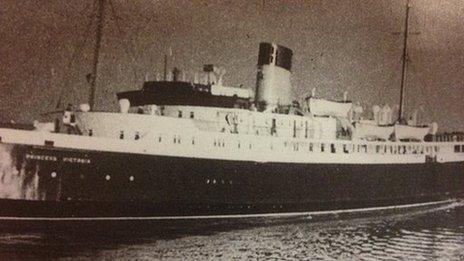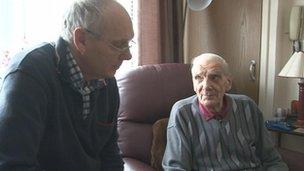Princess Victoria cook's shift change saved his life
- Published
George Jamieson: "It preyed on my mind"
"I'm a quiet person, I don't like talking about things."
And yet, when he opens up after almost 60 years, George Jamieson has a remarkable story to tell.
In January 1953, he was working as a cook on the Princess Victoria sailing between Stranraer in south west Scotland and Larne in Northern Ireland.
He normally did the nightshift but was providing daytime holiday cover until the end of month.
It was only the illness of one of his children which prompted him to ask to change shifts in order to help his wife.
That was a request which almost certainly saved his life.
"I got word on Thursday 29 January that my son was ill," he explained.
"I wanted to go back onto my nightshift again and I asked the chief steward but he said: 'I don't think it would be possible.'"
However, they called in at the marine office to make the request anyway.
Mr Jamieson, now aged 87, was told it was "unusual for a shift to finish in the middle of the week" and they would normally run until the Saturday.
However, they eventually allowed the change.
"They said alright, you can take over your nightshift on Friday night and we'll alter the reliefs to go back onto their shifts on the Saturday morning," he recalled.

The Princess Victoria sank on 31 January 1953 with the loss of 133 lives
So, he finished his shift in the early hours of Saturday, 31 January 1953.
"About half past six, that was the time I finished the shift," he said.
"I was home for about 10 o'clock in the morning.
"The wife's sister came down, she came to the door, and I opened the door and she almost collapsed when she saw me - she didn't know I had changed shifts.
"She came down to tell her that the ship was in trouble.
"The wife had been down the street for shopping and she had heard the same thing too."
Mr Jamieson could pick up signals from the Portpatrick Lifeboat saying that they were in among wreckage by early afternoon.
It turned into a disaster in which some 133 lives were lost.
"We got it confirmed about two o'clock that she had sunk," said Mr Jamieson.
"She shouldn't have sailed.
"I don't know what happened for two wee towns to suffer a disaster like that.
"I definitely thought she would be tied up for the day."
The Stranraer pensioner is pretty much certain he would have perished had he been aboard.

Mr Jamieson asked to change shifts in order to help care for his son Billy, left, who was ill at the time
"John Wallace took my position and he joined on Saturday morning and he was lost," he said.
"I felt pity for him and I told the wife.
"She said to me: 'Look Lofty - that is what they call me - don't forget you've two sons yourself, it could have been you.'"
"I thought for a minute - fate for one, fatal for the other. That's life.
"It preyed on my mind for quite a long time."
To this day, Mr Jamieson gets annoyed when he hears people speaking about the tragedy who were not even alive when it took place.
He remembers vividly how it affected the area.
"It had a great impact really, people were saddened," he said.
"It was a big loss for this area and Larne because the crew was almost half and half.
"I knew them all, I lost a lot of friends that day."
Seeing a memorial to the victims brings back memories of those friends and, up until a few years ago when ill health prevented him, Mr Jamieson would attend the annual ceremony in their honour.
"It has been more or less with me for the last 60 years," he said.
"I had a chance and I was given that chance and it just happened to be. I was the lucky one, definitely."
Mr Jamieson told his story to BBC Scotland's Willie Johnston.
- Published25 January 2013